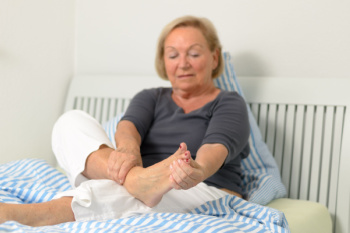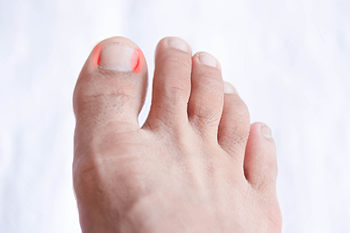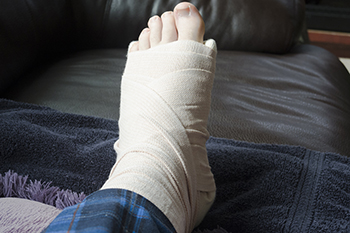Connect With Us
Blog

Achilles tendon pain in runners often results from repeated stress on the tendon due to overtraining, poor running form, or wearing unsuitable footwear. Factors such as running on uneven surfaces, failing to warm up, or training with tight calf muscles can place added strain on the Achilles tendon where it attaches to the heel. Pain may begin as a mild discomfort after running, and progress to more constant pain with thickening of the tendon. Without proper medical attention, the tissue can become scarred, reducing flexibility and increasing the risk of further damage. Runners who place uneven pressure on one side of the foot or rely heavily on the forefoot when running are also more likely to develop this condition. A podiatrist can evaluate the structure of the foot and ankle, conduct a gait analysis, and assess tendon involvement through diagnostic imaging. In serious cases, surgery may be required to remove damaged tissue or repair the tendon. If you experience Achilles tendon pain from running, it is suggested that you schedule an appointment with a podiatrist for an exam, diagnosis, and appropriate treatment.
Achilles tendon injuries need immediate attention to avoid future complications. If you have any concerns, contact one of our podiatrists of Cleveland Foot & Ankle Clinic. Our doctors can provide the care you need to keep you pain-free and on your feet.
What Is the Achilles Tendon?
The Achilles tendon is a tendon that connects the lower leg muscles and calf to the heel of the foot. It is the strongest tendon in the human body and is essential for making movement possible. Because this tendon is such an integral part of the body, any injuries to it can create immense difficulties and should immediately be presented to a doctor.
What Are the Symptoms of an Achilles Tendon Injury?
There are various types of injuries that can affect the Achilles tendon. The two most common injuries are Achilles tendinitis and ruptures of the tendon.
Achilles Tendinitis Symptoms
- Inflammation
- Dull to severe pain
- Increased blood flow to the tendon
- Thickening of the tendon
Rupture Symptoms
- Extreme pain and swelling in the foot
- Total immobility
Treatment and Prevention
Achilles tendon injuries are diagnosed by a thorough physical evaluation, which can include an MRI. Treatment involves rest, physical therapy, and in some cases, surgery. However, various preventative measures can be taken to avoid these injuries, such as:
- Thorough stretching of the tendon before and after exercise
- Strengthening exercises like calf raises, squats, leg curls, leg extensions, leg raises, lunges, and leg presses
If you have any questions please feel free to contact our offices located in Cleveland, Independence, and Kent, OH . We offer the newest diagnostic tools and technology to treat your foot and ankle needs.

Gout is a form of arthritis that develops when uric acid crystals accumulate in the joints, commonly in the big toe, causing pain, swelling, and inflammation. Although it is more common in men, women, particularly after menopause, are also at risk due to hormonal changes that affect uric acid levels. Other risk factors include a diet high in red meat, seafood, and sugary beverages, as well as conditions such as obesity, hypertension, and kidney disease. Managing gout involves maintaining a healthy diet, staying hydrated, and avoiding alcohol and purine-rich foods. Medication that lowers uric acid levels may also help prevent flare-ups. Regular exercise and weight management can reduce pressure on the joints. Gout can cause severe pain, and it may be difficult to complete daily activities. If you have symptoms of gout, it is suggested that you consult a podiatrist who can help you manage this condition.
Gout is a foot condition that requires certain treatment and care. If you are seeking treatment, contact one of our podiatrists from Cleveland Foot & Ankle Clinic. Our doctors will treat your foot and ankle needs.
What Is Gout?
Gout is a type of arthritis caused by a buildup of uric acid in the bloodstream. It often develops in the foot, especially the big toe area, although it can manifest in other parts of the body as well. Gout can make walking and standing very painful and is especially common in diabetics and the obese.
People typically get gout because of a poor diet. Genetic predisposition is also a factor. The children of parents who have had gout frequently have a chance of developing it themselves.
Gout can easily be identified by redness and inflammation of the big toe and the surrounding areas of the foot. Other symptoms include extreme fatigue, joint pain, and running high fevers. Sometimes corticosteroid drugs can be prescribed to treat gout, but the best way to combat this disease is to get more exercise and eat a better diet.
If you have any questions please feel free to contact our offices located in Cleveland, Independence, and Kent, OH . We offer the newest diagnostic and treatment technologies for all your foot and ankle needs.

Ingrown toenails occur when the edges of a toenail grow into the surrounding skin, causing pain, swelling, and redness. This condition most commonly affects the big toe and can result from improper nail trimming, wearing tight shoes, or trauma to the toe. In some cases, ingrown toenails can develop due to fungal infections or genetic factors. Symptoms include sharp pain, tenderness, and swelling surrounding the affected toenail. In more severe cases, an infection may develop, leading to pus or discharge from the area. The toe may appear red or inflamed, making wearing shoes or walking uncomfortable. A podiatrist can diagnose and treat ingrown toenails through various methods, such as recommending proper nail care, prescribing antibiotics for infections, or performing minor surgery to remove the ingrown portion of the nail. If you have a painful ingrown toenail, it is suggested that you schedule an appointment with a podiatrist, who can provide appropriate treatment solutions.
Ingrown toenails may initially present themselves as a minor discomfort, but they may progress into an infection in the skin without proper treatment. For more information about ingrown toenails, contact one of our podiatrists of Cleveland Foot & Ankle Clinic. Our doctors can provide the care you need to keep you pain-free and on your feet.
Ingrown Toenails
Ingrown toenails are caused when the corner or side of a toenail grows into the soft flesh surrounding it. They often result in redness, swelling, pain, and in some cases, infection. This condition typically affects the big toe and may recur if it is not treated properly.
Causes
- Improper toenail trimming
- Genetics
- Improper shoe fitting
- Injury from pedicures or nail picking
- Abnormal gait
- Poor hygiene
You are more likely to develop an ingrown toenail if you are obese, have diabetes, arthritis, or have any fungal infection in your nails. Additionally, people who have foot or toe deformities are at a higher risk of developing an ingrown toenail.
Symptoms
Some symptoms of ingrown toenails are redness, swelling, and pain. In rare cases, there may be a yellowish drainage coming from the nail.
Treatment
Ignoring an ingrown toenail can have serious complications. Infections of the nail border can progress to a deeper soft-tissue infection, which can then turn into a bone infection. You should always speak with your podiatrist if you suspect you have an ingrown toenail, especially if you have diabetes or poor circulation.
If you have any questions, please feel free to contact our offices located in Cleveland, Independence, and Kent, OH . We offer the newest diagnostic and treatment technologies for all your foot care needs.

A broken foot can result from direct impact, falls, crush injuries, or repetitive stress. Symptoms include pain, swelling, bruising, limping, and difficulty bearing weight. The severity of a foot fracture depends on which of the 26 bones in the foot is affected. A podiatrist can diagnose your injury using X-rays or advanced imaging such as a CT scan. Treatment may involve immobilization with a stiff-soled shoe, boot, or brace to support healing. Some fractures, particularly those that involve joint surfaces or cause displacement, may require surgery to restore alignment. One possible complication of a foot fracture is non-union, which occurs when a broken bone fails to heal properly due to poor blood supply, continued movement at the fracture site, or other factors. This can lead to chronic pain and instability in the foot. Other complications include arthritis, if a joint is involved, and infection if the skin is broken. Recovery time depends on the type and location of the fracture. If you have a broken foot bone, it is suggested that you schedule an appointment with a podiatrist for an exam, diagnosis, and treatment options, which may include surgery.
A broken foot requires immediate medical attention and treatment. If you need your feet checked, contact one of our podiatrists from Cleveland Foot & Ankle Clinic. Our doctors can provide the care you need to keep you pain-free and on your feet.
Broken Foot Causes, Symptoms, and Treatment
A broken foot is caused by one of the bones in the foot typically breaking when bended, crushed, or stretched beyond its natural capabilities. Usually the location of the fracture indicates how the break occurred, whether it was through an object, fall, or any other type of injury.
Common Symptoms of Broken Feet:
- Bruising
- Pain
- Redness
- Swelling
- Blue in color
- Numbness
- Cold
- Misshapen
- Cuts
- Deformities
Those that suspect they have a broken foot shoot seek urgent medical attention where a medical professional could diagnose the severity.
Treatment for broken bones varies depending on the cause, severity and location. Some will require the use of splints, casts or crutches while others could even involve surgery to repair the broken bones. Personal care includes the use of ice and keeping the foot stabilized and elevated.
If you have any questions please feel free to contact our offices located in Cleveland, Independence, and Kent, OH . We offer the newest diagnostic and treatment technologies for all your foot and ankle needs.
Blog Archives
- April 2025
- March 2025
- February 2025
- January 2025
- December 2024
- November 2024
- October 2024
- September 2024
- August 2024
- July 2024
- June 2024
- May 2024
- April 2024
- March 2024
- February 2024
- January 2024
- December 2023
- November 2023
- October 2023
- September 2023
- August 2023
- July 2023
- June 2023
- May 2023
- April 2023
- March 2023
- February 2023
- January 2023
- December 2022
- November 2022
- October 2022
- September 2022
- August 2022
- July 2022
- June 2022
- May 2022
- April 2022
- March 2022
